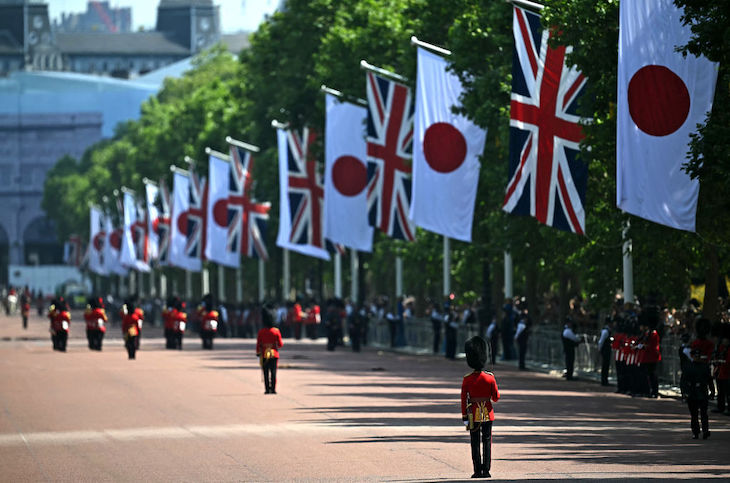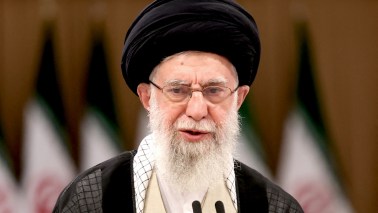The Japanese Emperor is in London today for a state visit, the first by the occupant of the chrysanthemum throne to the UK for 26 years. Along with a trip to Buckingham Palace, Emperor Naruhito, accompanied by his wife Empress Masako, will inspect the Thames barrier, which the Emperor studied as a student. He’ll then proceed to Oxford where he spent happy years as an undergraduate. The Emperor will also pay a private visit to St. George’s chapel and lay a wreath at the tomb of Queen Elizabeth II. Naruhito is a genuine Anglophile.
You may not hear too much about this visit, due to other salient events obviously (there won’t be a meeting with Rishi Sunak) and the characteristically low-key way the Japanese Emperor goes about his duties. The visit (postponed from 2020 due to Covid) is being characterised as a celebration of long-standing ties between the two royal houses and the UK and Japan more broadly. A courtesy call, in other words. But, as ever with Japan, there is probably a bit more to it than meets the eye.
For one thing, it will mark a vivid contrast to the last official visit in 1998 when Emperor Akihito was met with hostility from some veterans of World War II, who turned their backs on him during the procession down the Mall. There were further protests at Westminster Abbey and Cardiff. The current Emperor, like the current King, are the first monarchs of their respective countries to be born after the end of World War II so there will surely be no repeat. This visit may provide a certain quiet closure to that unpleasant episode, which in the telescoped history of these ancient royal houses feels like yesterday.
There will, of course, be sympathy and concern for the King and the Princess of Wales’ cancer diagnoses along with Princess Anne’s recent accident. This will not simply be dutiful, but informed and, for King Charles, possibly greatly encouraging. The current Emperor’s father, Akihito (emperor from 1989 to 2019) was diagnosed with prostate cancer at around the age King Charles is now. The former emperor underwent surgery in January 2003 and had a heart bypass in 2012. He is still going strong at 91 in happy retirement with former empress Michiko.
The stresses and strains of their extraordinary positions in life will be a point of empathy too. Empress Masako had some difficulty soon after the birth of her only child Princess Aiko. It was termed ‘short-term adjustment disorder’ and seems basically to have been the result of a highly intelligent and intellectually active woman finding herself suddenly expected to do no more than provide a male heir and appear demure and serene at public events.
The princess withdrew from public duties and was heavily criticised, at least as much as Japanese royals ever are, by the press (she was called a ‘broken butterfly’). She seems to have overcome her difficulties. But if King Charles or Queen Camilla are finding any part of their still fairly recent elevation challenging or, dare I say it, tedious, they will be in the company of someone who understands deeply.
There are family issues that overlap too, including rogue members who have, to differing degrees, caused upset and upheaval. For Meghan and Harry, read Mako and Kei; and while the former continue to be an irritant, the latter – a princess, who dramatically quit the royal household and her beau a commoner – are now seemingly happily married and living in obscurity in New York. The whole affair seems to have resolved itself about as well as could be expected. While Megan and Mako could hardly be more different, the King may find some comfort in how this story has concluded.

Then there is the attitude of the public, which in contrasting ways remains unsatisfactory. In Britain, criticism of the royal family often stems from their over-exposure (we know too much about them) while in Japan the opposite is true. The Japanese see so little of their royal family that they have become almost liminal figures, glimpsed on the TV news waving from balconies or through the curtained windows of limousines.
Overprotected, some say, their seeming lack of relevance to the everyday life of ordinary Japanese has led to sniping about cost (surprisingly perhaps the Japanese royal household costs more than the British, with the argument about tourism compensating hardly applying; who goes to Japan in hopes of a glimpse of a royal?). There is no serious republican movement in Japan but there is criticism of utility of the royals along with indifference. ‘They are just boring,’ concluded a Japanese friend.
None of these things, save the health situation, may be directly discussed, but you can be sure they will be subtly acknowledged – the ‘air will be read’ as the Japanese say – giving a rare form of comfort. Also important, for the Emperor and empress at least, is that whatever will be said will be said in English allowing the Japanese royals a break from the stifling conformity of the formal version of their native language. A courtesy call then, yes, but with benefits.








Comments